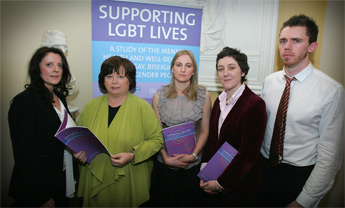Posted 11 February 2009
Research on the Mental Health of Lesbian, Gay, Bisexual and Transgender People
The Minister for Health and Children, Mary Harney recently launched the report Supporting LGBT Lives. The research was co-led by Dr Audrey Bryan from the UCD School of Education, and Dr Paula Mayock from the Children’s Research Centre, Trinity College Dublin. Other authors of the report include Nicola Carr of the Children’s Research Centre, and Karl Kitching of University College Cork.
“This research is the most significant study of Lesbian, Gay, Bisexual and Transgender (LGBT) mental health and well-being in Ireland to date,” said Michael Barron, Director of BeLonG To Youth Service, commissioner of the research along with GLEN – the Gay and Lesbian Equality Network. The report outlines findings from 1,110 completed online surveys and from 40 in-depth face-to-face interviews with lesbian, gay, bisexual and transgender people of all ages.

Pictured at the launch (l-r): Dr Paula Mayock, Minister Mary Harney T.D., Dr Audrey Bryan of UCD, Nicola Carr and Karl Kitching
“The study’s findings are complex and multi-faceted,” said Dr Paula Mayock. “On the one hand, they demonstrate that LGBT people can experience high levels of distress related to the presumption heterosexuality and within a range of settings and institutions including their schools and families. A majority reported experiences of victimisation, ranging from verbal to physical abuse, and almost two-thirds reported homophobic bullying in their schools. These findings highlight the continued negative effects of stigmatisation and discrimination – what we term minority stress - on the lives of LGBT people. On the other hand, a majority of respondents were either ‘comfortable’ or ‘very comfortable’ with their LGBT identification and many demonstrated resilience despite the adversities they often confronted as part of everyday life”.
Some of the key findings that demonstrate the level of harassment experienced by LGBT people are:
- 80% of online respondents had been verbally abused because of their LGBT identity
- 40% were threatened with physical violence
- 25% had been punched, kicked or beaten
- 58% reported the existence of homophobic bullying in their schools
- Over half had been called abusive names related to their sexual orientation or gender identity by fellow students
- 40% had been verbally threatened by fellow students
- 25% of the overall sample had been physically threatened by their school peers
- 20% missed or skipped school because they felt threatened or were afraid of getting hurt at school
- 34% reported homophobic comments by teachers or other staff members
- A quarter of those who had ever worked had been called abusive names related to their sexual orientation or gender identity with 15% being verbally threatened and 7% physically threatened by work colleagues
For the most vulnerable, the research showed heightened levels of psychological distress arising from stigmatisation and harassment, leading to significant levels of self-harm and suicidality (seriously considering or attempting suicide). A picture emerged, from the online research, of the most vulnerable participants:
- 27% had self-harmed at least once
- 85% of those who had self-harmed had done so more than once
- 40% of female respondents and 20% of male respondents reported a history of self-harm
- 16 years of age was the average age of onset of self-harm
- Over 50% of those who self-harmed did not seek any form of help
- 17.7% of the online sample had attempted suicide, of whom almost half saw this as related to their LGBT identity
- 17 and a half years of age was the average age of first suicide attempt
- 25% of female respondents and 15% of males had attempted suicide at least once
- Of those 25 and under, over a third had thought seriously about ending their lives in the past year.
“While the report suggests that a significant minority of LGBT people experience adverse mental health outcomes, the findings also suggest that LGBT people are highly diverse and resilient, are therefore not inevitably ‘at risk’ of developing mental health difficulties. In keeping with structural basis of homo/transphobia, the report’s recommendations are directed primarily at achieving social and institutional change as a means of tackling LGBT minority stress. Central to the recommendations is the need to address the embeddedness of heteronormativity within social institutions like education and health, where heterosexuality is often presumed to be normal, natural and the only way to be”, stated Dr Audrey Bryan.
The research found that the most common age that LGBT people realised their sexual orientation or gender identity was 12 years of age, with the average being 14 years; the most common age that they disclosed their identity to others was 17 years of age, with the average being 21 years. The findings on self-harm and suicidality were strongly linked to experiences of being physically or verbally threatened or being physically hurt; feeling alone and socially isolated, particularly in school, and a fear of or actually experiencing rejection by friends and family. Similarly, for those who attempted suicide, being physically threatened or attacked, or experiencing homophobic bullying in schools were identified as risk factors.
The research was funded by the Health Service Executive’s National Office for Suicide Prevention and commissioned by the Gay and Lesbian Equality Network (GLEN) and BeLonG To Youth Service
A full version of the report is available at www.belongto.org or www.glen.ie
